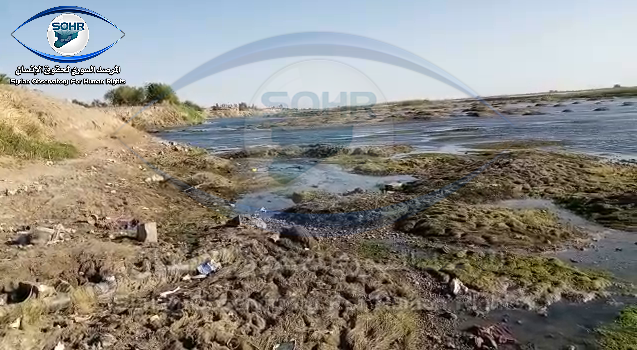Looming disaster | Euphrates river water decreases to alarming level, as Turkey continues to seize of Syria’s water share
Turkish government continues to block the flow of Syria’s water share in Euphrates river which is the most major source of water for drinking, irrigation and generating electricity. The Turkish water seizure and subsequent drought of Euphrates river water in Deir Ezzor and other areas in north and east Syria have led to water pollution and spread of rubbish on large spaces of the river, while the residents living in areas near the river concern bout a looming disaster.
It is worth noting that the decreased level of Euphrates river water threaten the summer crops which are irrigated with the river’s water in north-east Syria region, Deir Ezzor in particular.
In this context, the official responsible for the water affairs in Deir Ezzor commented on the issue of the decreased water level in Euphrates river, warning against a looming disaster. The official told SOHR, “problems have been detected in water stations and other problems which have affected farmlands and livestock. Four water stations on the western line have been put out of service; and they are Al-Kebar station, a grand station providing five villages with water supplies, Al-Saghir station and Al-Sa’wa station. People is these areas are struggling with the recent low level of water, as they need to buy water tanks for high prices, let alone the increasing pollution of the river’s water.”
The official also pointed out that the drought has badly impacted crops, especially summer crops such as vegetables and cotton, as they need water in this time of the season in order to ripen. The official has also appealed to the United Nations and humanitarian organisations to put an end to violations by Turkey which has deliberately blocked the flow of Syria’s water share in Euphrates river and to exert diligent efforts to solve this social, humanitarian and economic problem.
On the other hand, a 54-year-old farmer known as Taha Al-Ahmed from Deir Ezzor countryside told SOHR, “the decreased water level affects us greatly, as we live on farming and we rely on the Euphrates river water for irrigation. If there were no water, we would not have settled in this region for ages. This season, wheat did not grow up as we could not provide it with needed amounts of water in the wake of the current crisis.”
According to the agreement reached between Syria and Turkey in 1987 regarding the share of each country of Euphrates river water, Syria’s share of water coming from Turkey was supposed to be 500 cubic meters per second.
The Syrian Observatory for Human Rights warns against an environmental catastrophe threatening food security in the Syrian Jazeera region and a humanitarian crises which poses a threat to nearly two million and half people in different areas in al-Raqqah, al-Hasakah, Deir Ezzor and Aleppo.
A few days ago, SOHR sources reported that Euphrates water level dropped to record levels, seriously threatening Syria’s food security.
The water level of the Euphrates River had reduced below 400 cubic meters per second, putting the population of northern and eastern Syria in the face of a humanitarian catastrophe due to water depletion, sources of Tishreen Dam Department reported.
Tishreen Dam Department pointed out that the dam worked only six hours a day, declining energy rationing hours.
Euphrates river originates from spring in Taurus Mountains in Turkey and flows into Syria from Jarablus city in the northern countryside of Aleppo through Al-Raqqah province in the north and to Deir Ezzor in the east, running along an area of 610 km in Syria all the way to Iraq, and passing through three countries, from Turkey to Syria, and Iraq.
Two main dams were built on Euphrates river: namely the Tishreen Dam in the northern countryside of Aleppo, Al-Tabqah Dam where a huge Assad lake is located in the western countryside of Al-Raqqah, and Al-Mansoura Dam in Al-Raqqah province.
Al-Tabqah and Tishreen dams cover 90% of the electricity needs of northeastern Syria, including the current needed for water pumping stations. However, the significant drop in the water level threatens electricity production.
In 1987, Syria signed a water-sharing agreement with Turkey, according to which Ankara pledged to provide Syria with an annual rate of 500 cubic meters per second, but this amount has decreased by more than half during the past months, and at certain times reached 200 cubic meters per second, according to technicians.
Tishreen Dam Department warns of a “historic and terrifying drop” in the water level that the dam has not witnessed since its construction in 1999.
Since December, the water level in the dam has decreased by five metres, and if it continues to decline, it will reach what Tishreen Dam Department described as the “dead level,” which means that the “turbines will completely stop working.”
In addition to the decline in the region’s electricity supply, several water pumping stations have stopped working. The low water level threatens to increase the rate of pollution and endanger fish wealth.
According to the Syrian Observatory, the significant decline in Euphrates water level in Al-Tabqa, Tishreen and Ba’ath dams hit and affected agricultural production on more than 475,000 acres of “200,000 hectares” of irrigated land.
Local farmers lost 80 percent of their crop in Al-Hasakah and Al-Raqqa, which provides Syria with more than 90 percent of bread baskets, according to the agriculture department of Autonomous Administration.
The livestock sector has also been affected badly as farmers have to sell their livestock due to a lack of feed, scarcity of pasture, poor rainy season, grass, and inability to buy fodder due to the increase of fodder prices by 200 percent.
Furthermore, the drinking water catastrophe worsens, with drinking water being rationed throughout Syria, forcing people to rely on unsafe water sources and costly private water transport services.

